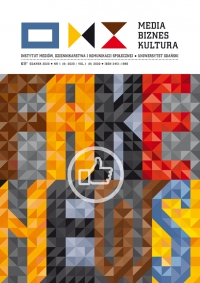Orientalny Towar. Amerykańskie media liberalne i reprodukcja rasizmu
Słowa kluczowe:
media, orientalizm, komercjalizacja, kobiety, rasizmAbstrakt
Celem artykułu jest krytyczna analiza elementów fabuły jednego z najbardziej popularnych amerykańskich seriali o tematyce prawnej i politycznej – The Good Wife. W centrum mojego zainteresowania znalazła się drugoplanowa bohaterka – Kalinda Sharma. Dekonstrukcja wątków związanych z tą postacią pozwala zdemaskować liczne stereotypy płciowe i etniczne dotyczące wyobrażeń „kobiety wschodu”. W tym miejscu artykuł wyraźnie koresponduje z rozważaniami E. Saida i współczesną krytyką postkolonialną. Co ciekawe, serial sygnowany był przez CBS, które walczy o wizerunek stacji liberalnej i równościowej. Punktem zwrotnym był tu rok 2010, w którym to CBS skrytykowano za dysproporcje w reprezentacji mniejszości etnicznych, a stacja obiecała zmianę swej polityki w tym zakresie. Niestety flagowy serial The Good Wife – zachował stereotypową figurę „kobiety wschodu”, która wciąż pełni rolę obcego/innego w kulturze zdominowanej przez białych.
Downloads
Bibliografia
Flint J., The Good Wife’ will have multiple partners in syndication, https://www.latimes.com/entertainment/envelope/la-xpm-2013-mar-13-la-et-ct-good-wife-20130313-story.html (access: 9.10.2019).
Gilbert M., Why the ‚Good Wife’ is network TV’s last great drama, https://www.bostonglobe. com/arts/television/2016/05/04/alicia-trials-end-left-with-void/8htg2Ify1RTF6niNKj9aSP/story.html (access: 22.10.2019).
Gramsci A., Selections from the prison notebooks, trans. Quintin Hoare and Geoffrey Nowell Smith, International Publishers, New York 1971.
Hall S., Encoding and decoding the message [in:] The discourse studies reader: Main currents in theory and analysis, eds. R. Angelmuller, D. Maingueneau, R. Wodak, John Benjamins Publishing Company, Amsterdam/Philadelphia 2014.
Hall S., Representation: Cultural representations and signifying practices, Sage, Thousand Oaks, CA 1997.
hooks b., Eating the other: Desire and resistance [in:] Black looks: Race and representation, South End Press, Boston 1992.
Johnson K., Lennon S.L., Rudd N., Dress, body and self: research in the social psychology of dress [in:] Fashion & Textiles, https://link.springer.com/article/10.1186/s40691-014-0020-7 (access: 21.09.2019).
Kabbani R., Imperial fictions: Europe’s myths of orient, Saqi Books, London 1994.
Kenneth A., The meaning of culture. Moving postmodern critique forward, Preager, London 1998.
Macfie A.L., Orientalism, Longman, London 2002.
Media Scope 1998, “Diversity in Film and Television”, http://www.diversity-film-television/2007/media-scope (access: 21.09.2019).
Molan B., How The Good Wife transformed TV, https://www.theguardian.com/tv-and-radio/2016/may/05/the-good-wife-final-season-julianna-margulies-cbs (access: 29.12.2019).
Rosenberg A., In praise of ‘The Good Wife’s’ Kalinda Sharma, https://www.washingtonpost.com/news/act-four/wp/2014/10/17/in-praise-of-the-good-wifes-kalinda-sharma/ (access: 23.12.2019).
Said E., Orientalism, Pantheon Books, New York 1978.
Sardar Z,. Orientalism, Open University Press, Philadelphia, PA 1999.
The Good Wife, prod. R. King, M. King, cast J. Margulies, M. Czuchry, A. Panjabi, A. Cumming, J. Charles, C. Baranski, S01-s01, 2009–2016.

 Uniwersyteckie Czasopisma Naukowe
Uniwersyteckie Czasopisma Naukowe




